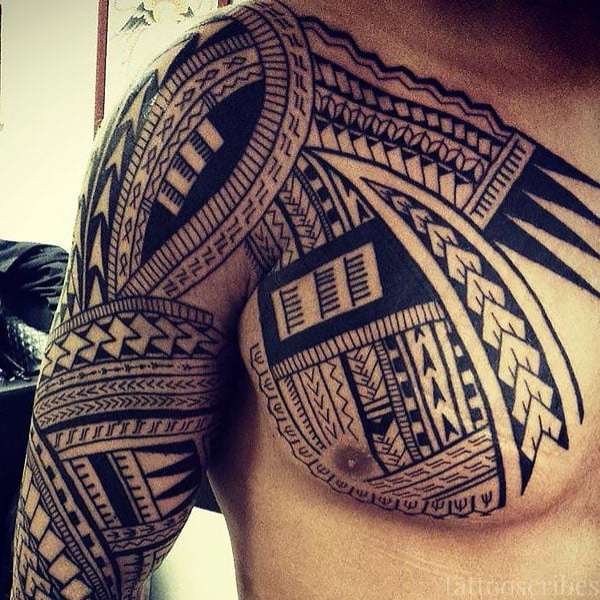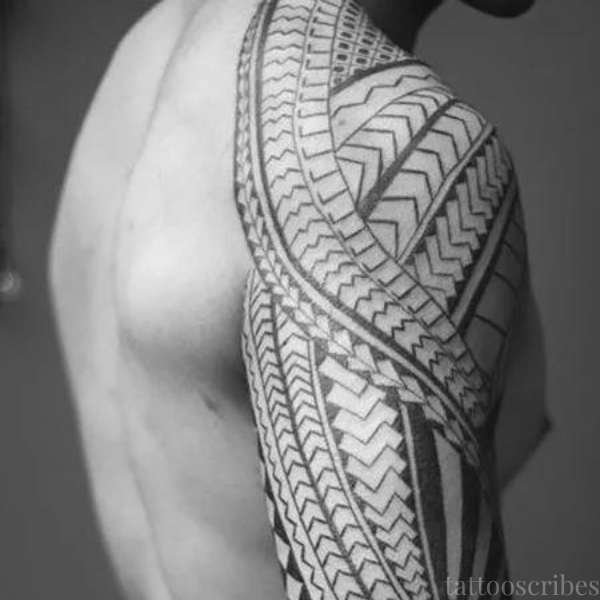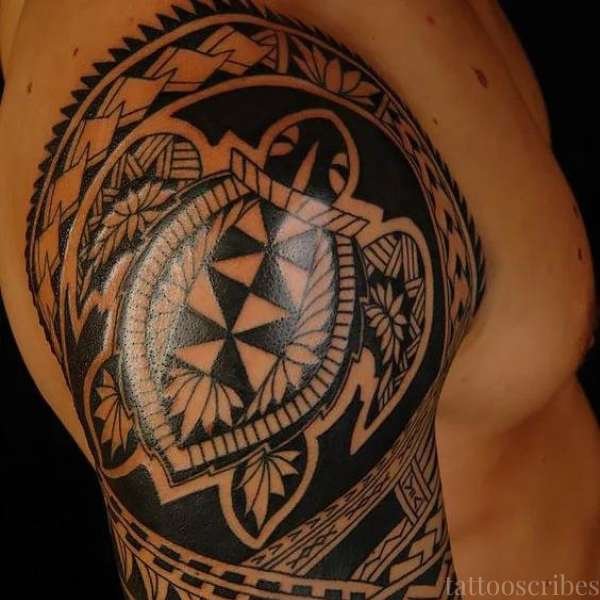Tribal tattoos have deep symbolism and meaning, making them a popular choice for many. Picture yourself sitting in a tattoo shop, excited to choose a design that reflects your personality and beliefs.
From spiritual tattoos to meaningful tattoo designs, the symbolism behind these tattoos can vary across cultures.
Whether you want a piece of art or a reminder, tribal tattoos are a powerful form of self-expression. Please keep reading to explore their significance!

What Do Tribal Tattoos Mean?
A tribal tattoo meaning represents cultural pride, power, and belonging. These designs often tell stories of ancestry, personal achievements, or spiritual journeys. Each pattern or line can hold deep significance, symbolizing unity, courage, and life’s path.
General Symbolism of Tribal Tattoos
- Strength – Shows physical and inner power through bold geometric lines.
- Identity – Expresses who you are, where you come from, or what you’ve endured.
- Spiritual Protection – Believed to guard the wearer from evil spirits or harm.
- Unity – Represents the bond between family, tribe, or community.
- Courage – Reflects bravery and the will to overcome struggles.
- Transformation – Marks rites of passage, growth, and new beginnings.

Cultural Meanings of Tribal Tattoos
- Polynesian – Each symbol reflects the wearer’s genealogy, social rank, and life milestones.
- Maori (Ta Moko) – Deeply personal facial tattoos tell one’s story and status.
- Samoan (Pe’a) – Represents honor, endurance, and service to family.
- Filipino (Batok) – Tattoos symbolize valor and protect against evil spirits.
- Native American – Designs honor nature, ancestors, and spirit guides.
- African Tribes – Tattoos mark courage, maturity, and tribal identity.
Learn more about choosing the right artist here.

Tribal Tattoo Variations and Designs
- Polynesian Armbands – Strength, heritage, and balance in life.
- Maori Spirals (Koru) – Growth, rebirth, and connection to nature.
- Tribal Sun Tattoo – Life, power, and eternal energy.
- Tribal Dragon Tattoo – Guardian spirit and protection from evil.
- Tribal Wolf Tattoo – Loyalty and pack connection.
Color Variations of Tribal Tattoo
- Black – Dominant color for power and mystery.
- Red Accents – Symbol of vitality and fire.
- White Ink – Represents purity and modern adaptation.
Get more aftercare tips here.

Other Symbolic Meanings of Tribal Tattoos
- Freedom – Expresses individuality and strength of spirit.
- Tradition Meets Modernity – A bridge between ancient art and modern self-expression.
- Sacrifice and Loyalty – A reminder of personal or ancestral devotion.
- Empowerment – Marks resilience and reclaiming one’s story.
- Connection to Nature – Represents harmony with the earth and natural cycles.
Meaningful Placement Ideas
- Shoulder/Arm – Strength and visible pride in heritage.
- Chest – Personal power, protection, and honor close to the heart.
- Back – Spiritual shield and ancestral guidance.
- Legs – Movement, life’s journey, and forward progress.
- Neck or Spine – Connection between spirit, body, and higher purpose.
You may also like below posts:
Frequently Asked Questions
Are tribal tattoos still popular today?
Yes, they remain popular for their timeless strength and cultural symbolism.
Do tribal tattoos have to reflect my heritage?
No, but it’s important to respect and understand their cultural roots.
Can I mix modern and traditional tribal designs?
Yes, many people blend ancient motifs with personal symbols.
Are tribal tattoos only black ink?
Traditionally yes, but modern versions may include red, white, or shaded details.
What does a tribal armband tattoo mean?
It often represents protection, strength, or eternal connection.
Do tribal tattoos hurt more than others?
Not necessarily—the pain depends on placement and size, not the style itself.
Wrap-up
Tribal tattoos are powerful forms of self-expression that blend art, culture, and personal significance.
By respecting their deep-rooted meanings and understanding the history behind the designs, you can honor their cultural importance while creating a meaningful tattoo that tells your unique story.
